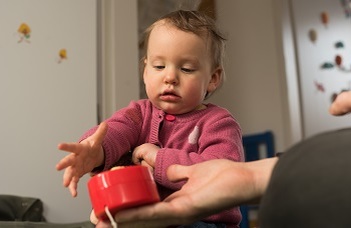Preschoolers' learning strategies

An article by Ildikó Király, professor, head of the Department of Cognitive Psychology at our faculty and the Babylab of ELTE, and her co-authors from Central European University, was published in the Journal of Experimental Child Psychology.
Abstract
Sub-efficient action routines often represent culture-specific conventional forms of actions that belong to the repertoire of cultural knowledge shared by a social group. Children readily acquire such sub-efficient routines from social demonstrations and often preserve them in their action repertoire despite encountering more efficient alternatives. This suggests that they can treat sub-efficient conventional forms and their efficient alternatives in a context-sensitive selective manner. We hypothesized that children may rely on their sensitivity to differentiate speakers of their own language versus a foreign language as an informative cue indicating whether the model belongs to their own cultural community and the action modeled represents shared cultural knowledge. We assessed preschoolers’ imitation following two different demonstrations. The first model demonstrated a sub-efficient action sequence, whereas the second model presented a more efficient alternative to obtain the same goal. We varied whether the children had heard the models speak their own language or a foreign language before their nonverbal action demonstrations. We found that 4-year-olds adopted the second model’s efficient alternative, but only when she spoke their own language. However, they disregarded the efficient alternative if it was presented by a foreign-language speaker and continued to perform the sub-efficient routine they initially acquired. Therefore, 4-year-olds employed the cue of shared language to optimize acquiring and maintaining culturally shared sub-efficient action routines by selectively updating their action repertoire relying on their language-based evaluation of the demonstrator’s culture-specific competence. In contrast, 5- and 6-year-olds adopted the efficient alternative independently of the demonstrator’s language. Possible reasons for this developmental trend are discussed.
The full article is available here.
Authors: Nazli Altinok, Mikołaj Hernik, Ildikó Király, György Gergely
You can read about the Babylab's previous research on cultural transmission here.

